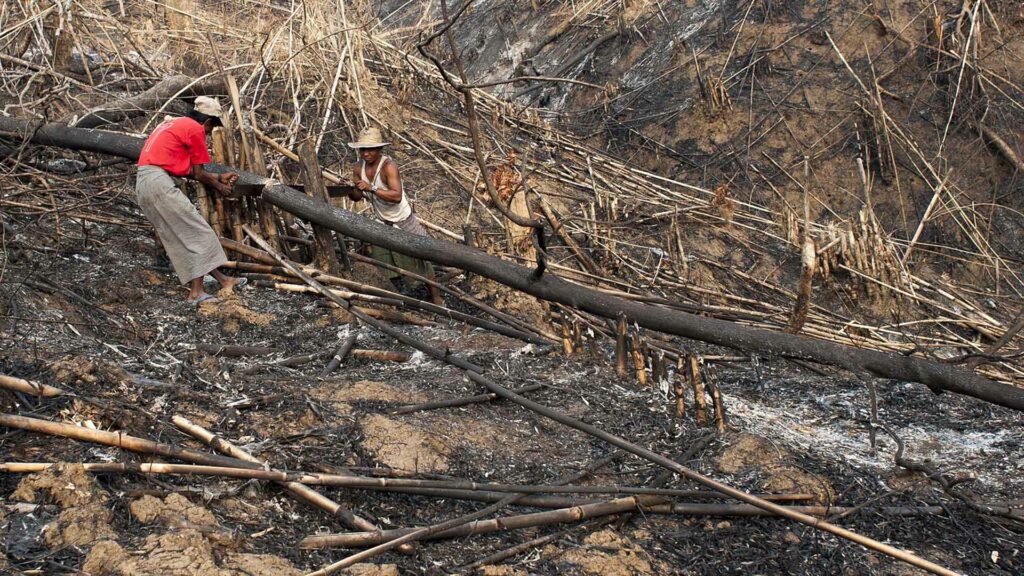A new EU law will require national authorities to conduct regular checks on companies importing wood and other commodities to ensure the products are not linked to deforestation. Image: Europol (Portugal)
Between 1990 and 2020, an area larger than the EU itself was lost to deforestation, according to the United Nations Food and Agriculture Organization. In 2016, the FAO estimated that consumer products sold in the EU were responsible for about 10% of the loss.
But interviews by ICIJ’s European reporting partners have found that some governments appear unprepared to implement the new law.
Many national officials said they plan to rely on a new monitoring system shared among EU member states and other technologies to help authorities identify suspect imports. Several cautioned that they don’t have the manpower to carry out all checks required by the EUDR.
Eugen Gioancă, the deputy inspector general of Romania, which is home to Europe’s largest old-growth forests, told ICIJ media partner Context the country’s environmental police forces lack resources to address widespread illegal logging and timber trafficking. “There are currently not enough staff in the National Forestry Guard and Forest Guards to check operators and traders who place/export or intend to place/export timber or timber products on the market in accordance with the provisions” of the new law, Gioancă wrote in a statement.
Similarly, a spokesperson for Belgium’s federal environmental ministry told ICIJ partner De Tijd that it expects to have a 10-person team carry out all inspections — less than half of the 22 personnel the agency previously said was required.
The Food and Consumer Product Safety Authority of the Netherlands, one of the EU’s largest importers of wood products, palm oil and other goods at risk of being connected to deforestation, will have just seven full-time positions to implement the EUDR, a spokesperson told NRC daily, an ICIJ partner in the Netherlands.
The Dutch agency is currently “in discussion with the Ministry of Agriculture, Nature and Food Quality about expanding capacity” under the new law, the spokesperson said. The role of the Dutch team is particularly important since the country re-exports most of the products, according to CBS, a state-funded think tank.
Germany’s officers with the Federal Office for Agriculture and Food told ICIJ partners at NDR that the agency is expected to carry out about 2,500 inspections a year — a sharp increase compared to the roughly 200 conducted on average annually since 2010. According to the agency’s spokesperson, “on-site inspections are only planned in cases of concrete suspicion or on a random basis,” and will be decided depending on whether the goods are imported from a country considered at high risk of deforestation.
In Austria, where some of the world’s largest wood-processing companies are headquartered, five agents with the Federal Forest Office currently conduct about 30 inspections a year. After the new rules go into effect, the agency expects a “multiplication of official inspection activities,” its director, Peter Mayer, said in a statement to ICIJ’s reporting partner Profil.
Representatives from the European Commission, and Italy and France’s agriculture ministries in charge of implementing the EUDR did not respond to questions from ICIJ and its media partners.
For Johannes Zahnen, an environmental engineer who works for the conservation organization World Wildlife Fund, the new EU law represents a potential “step forward” in the fight against deforestation, but only if properly implemented.
The law can be “a lever to minimize forest destruction,” Zahnen told NDR. However, if governments don’t allocate enough staff, “that would be a first indicator that the EUDR is not being taken seriously,” he said. “That would be a disaster.”
Contributors: Jelena Cosic and Miguel Fiandor (ICIJ), Lars Bové (De Tijd), Karljin Kuijpers (NRC), Stefan Melichar (profil), Gloria Riva (L’Espresso), Benedikt Strunz (NDR), Mihaela Tănase (Context)
Source link : https://www.icij.org/investigations/deforestation-inc/myanmars-controversial-timber-trade-persists-despite-western-sanctions/
Author :
Publish date : 2024-02-29 08:00:00
Copyright for syndicated content belongs to the linked Source.
